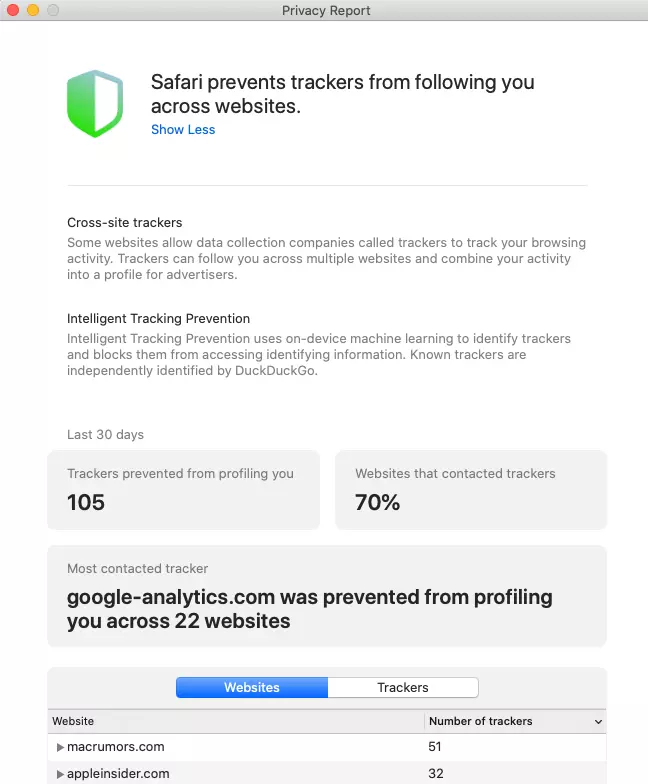Apple's Safari Browser Got An Update To Prevent Trackers, How Does That Affect Your Analytics Data?
On Wednesday September 16, Apple released a new version of its Internet browser Safari (Version 14.0) that has a new feature called, Privacy Policy. What does this change mean for your internet marketing? How will it affect website conversion rate tracking? Let us simplify the answer to those questions and more.
With this update automatically installing on nearly all Apple products, it has many marketers, web designers, and analytics teams worried. Especially since Apple has targeted Chrome to overtake it in speed and now in extensions. People are more enticed to switch back to Safari since it is much more efficient on RAM than Chrome is.
At first, I was worried that this would stop all tracking on our websites that we analyze data on. However, after exploring our realtime analytics reports, we can see people move around our website without issue. Further review of our data more in depth, we didn't see any drops in traffic from the new feature. Safari still shows up as a browser in the reports, and conversion and event data are still populating for it. So if the on-website tracking is still working, what is being blocked exactly?
Only A Specific Set Of Trackers Are Being Blocked
In the screenshot below, you can see that Google Analytics is being blocked, but not entirely. They have it phrased as "profiling you" instead of "tracking you." So it must be a specific set of cookies that are being blocked.

What Are Tracking Cookies?
Cookies are small bits of code that are saved to your device while browsing a website. These items carry a bit of information about your browser and communicate that back to a website. Although that can sound scary, cookies are not all bad. Cookies make your internet experience better. For example, a cookie will allow you to stay logged into your online store account without having to annoyingly re-enter your login credentials every time you navigated to another page. Or if you are shopping you can add multiple items to your cart. Without cookies, every time you added an item, the previous one would go out forcing you to buy only 1 item at a time.
Cookie Categories
Did you know that there are different types of cookies. For our purposes today, we will be talking about two of them: first party and third party.
First Party Cookies
First-party cookies are cookies that are set by the website itself. That cookie is only able to be accessed by that specific domain itself. These cookies are what make the website able to track your movements and remember your preferences, such as items in your shopping cart or if you are logged in or not. These are helpful cookies that are only used by the website you are interacting with. Without first-party cookies, web designers wouldn't be able to learn what they need to improve about a website and your experience would be very different as a result.
Third Party Cookies
Third Party Cookies are cookies that are not set by the website itself. These are set by an external source and can track your movements across the entire world wide web. These are also known as Cross-Site Trackers. These cookies "profile" you and try to get as much information as possible to share with advertisers. This is why you see certain ads for products or services you've previously browsed or shopped for on other websites. The reason you see these ads that eerily know what you tend to like is because you were on a website that had the third-party cookie. You got profiled and then when you visited a different website (with the same third-party code) was able to track you so you could be shown an ad to entice you to buy that product or service you were looking at previously.
Looking at the earlier screenshot above, we can see that Safari is blocking the cross-site trackers —the third party cookies.
How Will Safari's Privacy Report Effect Advertisers And Web Developers?
The good news for web developers is you will still be able to see your session information in order to make web performance reports. Event-level tracking, sessions, and conversions are not affected and will operate just fine. For advertisers, you will still be able to track conversions from your ads and see performance information from your search and display ads. However, remarketing campaigns will be heavily affected since they use the third party cookie to track users across the web.
This does not mean that all display campaigns will go away. Those image ads in the sidebars and tops of websites still do a great job of enticing visitors to a service, however, they will revert back to contextual ads instead. Contextual ads are image ads that are based upon what the user is currently looking at on the website they are currently browsing. So profiling is no longer possible. So if the website you are visiting is a shoe blog, the ads will most likely only be about buying shoes, shoe cleaning products, shoe repair, etc.
Visit https://www.apple.com/privacy/ to see how Apple protects user privacy with their products.
